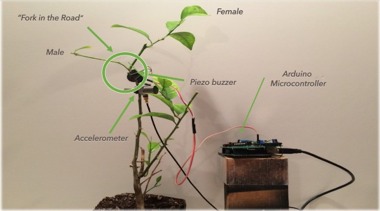Citrus greening is a disease that turns oranges sour and half-green, and it’s been ravaging orange groves in Florida for years. A novel strategy for controlling its spread may be found by mimicking the mating call of a tiny aphid-like brown insect called the Asian citrus psyllid.
Richard Mankin, an entomologist at the USDA’s Center for Medical, Agricultural and Veterinary Entomology in Gainesville, presented his scheme yesterday at a meeting of the Acoustical Society of America in Jacksonville, Florida. He has developed a type of vibration trap that disrupts communication between male and female psyllids, thereby controlling their spread.
Asian citrus psyllids aren’t exactly an orange grove’s friend. Their young feed on new shoots and leaves of the trees, sucking out the sap and injecting a toxin in its place. If the insect has previously fed on a plant containing the bacterium that causes citrus greening, it will infect the tree in turn.
Once that happens, it is a slow steady march toward the tree’s inevitable demise. First the leaves turn a blotchy yellow on a small limb; as the disease spreads throughout the tree, the fruit gets smaller and more bitter, often stating partially green instead of fully ripening. Eventually it will stop bearing fruit entirely and die. The whole process can take two to three years from the point of infection.
And there is no known cure. Infected trees have been chopped down, and farmers have started using various pesticides to kill the phillids, all to no avail. And over time the phyillids will develop resistance to the current pesticides.
Citrus greening has cost the Florida citrus industry billions of dollars to date and farmers are desperate for solutions — including a controversial proposal to genetically modify orange trees with DNA from a different species. Since there is no naturally immune species of orange tree, the reasoning goes, science must create one.

Mankin thinks his vibration traps could offer a more environmentally friendly solution. “The route I’m trying to take is looking at disrupting mating and putting out signals that either outcompete the females and bring males to a trapping system, or just make it difficult for males and females to communicate with each other,” he said in a press release.
The device is fairly simple: a piezoelectric buzzer and a microphone wired to a microcontroller. Total cost: between $US50 to $US100 each. It has yet to be tested in the field, but the idea is pepper orange groves with the traps. Per the press release:
Out in the mid-day heat of the orange groves — the psyllids are most active between 10:00 AM and 3:00 PM — the male psyllids channel their wing vibrations down their legs and out through adjacent twigs and leaves. If a nearby female is interested, she’ll reply back within a third to a half of a second. Within this window, the researchers’ microphone detects the incoming male call and the micro controller sends out a female response call through the piezoelectric buzzer before any neighbouring psyllids can. When the male draws closer, he gets snagged and immobilized on an adhesive surface, from where he can be collected during periodic trap inspections.
So male Asian citrus psyllids of the future, beware: that seductive mating call might just be leading you into a trap. At least the oranges will be safe.
Top image: Phomphan/Shutterstock. Bottom image: In-lab setup of the mimicry device. Credit: Mankin/USDA.
